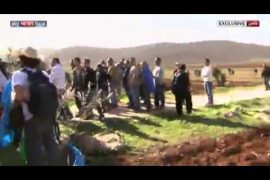1) Jonathan Spyer discusses the outcome of the recent election in Lebanon.
“Lebanon’s May 6 elections have resulted in the further consolidation of Hezbollah and its associated movements within the legal frameworks of the state. The movement and its allies won over half of the seats in the 128-seat parliament. At the same time, the 2018 elections do not appear set to usher in any fundamental alterations to the status quo in Lebanon.
The majority achieved was not sufficient as a basis for constitutional change to alter the rules of the game related, for example, to the sectarian power-sharing agreements that underly Lebanese political life.
However, Hezbollah and Amal and co will have comfortably more than their own “blocking third” in parliament, sufficient to prevent any changes not to their liking.”
2) At the Washington Times, Tony Badran and Jonathan Schanzer write about the same topic.
“Less discussed, but not less important, is that Lebanon is a headquarters for other elements of Iran’s regional terrorist network. It’s a fact the Lebanese interior minister openly acknowledged two years ago when he described Lebanon as “a global terrorist and security operations room.” Lebanon is currently the base for senior Hamas operative Saleh Arouri, who runs terror operations in the West Bank, and other officials from the Palestinian terrorist group. […]
Once again, the government in Beirut did nothing to stop this. Nor did it do anything to oust some of the other terrorist groups that target the Gulf Arab states. The Ansar Allah group in Yemen, better known as the Houthis, reportedly have been receiving training in Lebanon since at least 2010 — a fact some Hezbollah members have acknowledged publicly. The Houthis also have an office in Beirut, as well a television channel, which broadcasts Hezbollah-style propaganda.
Iran-backed terrorists have used Lebanon as a base from which to target other Gulf states, like Kuwait and Bahrain. But it certainly doesn’t end there. Just ask the Moroccans, who just last week accused Hezbollah of smuggling arms to the Polisario Front, a violent separatist group in the Western Sahara.”
3) Palestinian Media Watch has published a compilation of testimonies from Palestinian refugees.
“A number of points are very significant. First, these testimonies – though personal stories – are also describing large-scale movements, such as the flight from major cities like Jaffa and Safed. Second, they describe general orders to leave by Arab leaders and armies, broadcast on Arab radio to the entire Arab population. Third, the testimonies are presented openly by refugees themselves and by public figures, including leaders, in the official PA media. All of this suggests that awareness of Arab responsibility for the refugee problem must be widespread among the Palestinian population itself – even though Palestinian leaders refuse to accept responsibility in international forums.”
4) At the Times of Israel, David Horovitz discusses the ‘original sin’ of the Iran nuclear deal.
“The P5+1’s failure to stop the ayatollahs dead in their would-be nuclear tracks is mirrored by the demonstrably lackadaisical approach of the International Atomic Energy Agency, the UN body charged with policing the deal. How it can allow itself to certify that Iran is complying with the accord when the terms of the deal do not allow it to carry out anytime-anywhere inspections of suspect sites is beyond comprehension. And its response to the Mossad’s astonishing haul of Iran’s own nuclear weapons documentation in the past few days simply beggars belief.
Imagine that your entire life’s work is dedicated to one acutely sensitive area of expertise, that you are constantly hampered by restricted access to your core research material, but that you are nonetheless the world authority in your field. Then imagine that someone else manages, through extraordinary enterprise and courage, to gain access to more core material, much more, than you could ever have imagined existed. And offers to make it available to you.
Would you a) express your profound gratitude and rush to pore over the new discoveries or b) dismiss the material, sight unseen, as irrelevant? No prizes for guessing which course of action the IAEA adopted hours after Prime Minister Benjamin Netanyahu unveiled and began to detail Iran’s own nuclear weapons documentation, spirited out of Tehran from under the noses of the Islamic “We have never sought nuclear weapons” Republic.”



